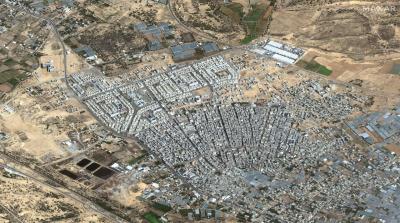The city of Rafah in southern Gaza encapsulates the tragedies of the Palestinians in the besieged territory, which has been experiencing a devastating war for over six months, claiming tens of thousands of lives so far. Israel claims that its main objective in attacking Rafah is to recover hostages taken on October 7 during Hamas's assault and to prevent the group from executing another attack against Israelis.
Israeli officials state that they are determined to close the smuggling tunnels used for arms and people between Gaza and Egypt, end the influence of the Iran-backed Palestinian group in the territory, and pressure Hamas to agree to a deal that would lead to the release of Israeli hostages. It is believed that many of the more than 130 hostages are being held in Rafah.
Many Israeli analysts, according to the American Jewish Committee website, assert that pressing Hamas in Rafah could force the organization to engage seriously in negotiations with Israel to release the hostages. Israel views Rafah as the last remaining stronghold of Hamas's military brigades and leadership. Israelis believe that defeating the remaining Hamas brigades in Gaza is essential to ensure that "the Iran-backed group no longer has the ability to kill Israelis," according to the same committee. It is thought that many senior leaders, including Hamas leader Yahya Sinwar, may be present there.
While Rafah holds strategic value in Israel's efforts to completely defeat Hamas, the organization utilizes the entire territory for its operations, as stated by former Israeli intelligence official Avi Melamed in an interview with the British newspaper "The Hill." Melamed said, "Hamas imagines itself as a regional player, and Israel needs to shrink its capacity to a level where it can no longer play this role." He added, "The way to do this actually requires two main elements: the first is significantly crushing the military backbone of Hamas, which is exactly what Israel is doing now, and the other is diminishing its role in Gaza, which is essentially the final stage."
### The Importance of Rafah for Hamas
Rafah is located next to Egypt and was previously one of the last borders operating in the occupied Palestinian territories and the only way for Palestinians to leave the Gaza Strip. Therefore, Israel intends to destroy all the tunnels that Hamas has excavated over its years of governance. Shortly after Hamas took control of the Gaza Strip in 2007, it began digging tunnels, which it is now fiercely trying to protect throughout the territory, particularly in the south towards Rafah.
With its leadership largely remaining in Rafah, Hamas can easily use the area as a base to reaffirm its control over the entire Gaza Strip if the war ends. Jonathan Lord, a senior fellow and director of the Middle East Security Program at the Center for International Studies, stated in an interview with "Foreign Policy" magazine that the city of Rafah appears somewhat different from other cities regarding its strategic importance to both sides of the conflict.
Lord noted that the Hamas brigades fighting in Rafah are indigenous to the region, relying on the Philadelphia Route, which is a dense network of tunnels. The Israelis attempted to build an underground wall to prevent Hamas from using this route, but they have not succeeded. He also said, "Hamas is likely entrenched and prepared to fight from positions where it can access the tunnels, resupply, and has the ability to infiltrate, escape, and move." Analysts have noted that Hamas might also prefer civilians in Rafah to obstruct operations against the Israelis, as the high population density there hinders any military action without causing severe casualties among civilians.




